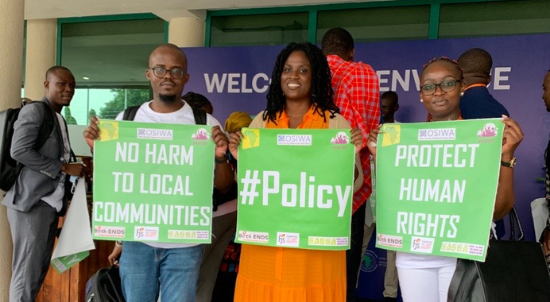“Stop funding projects exacerbating climate change and human rights violations”

Civil society groups demand more engagement on the sidelines of the AfDB Annual Meetings
ACCRA, 27 May 2022 – Civil society organizations are calling on the African Development Bank (AfDB) to stop funding projects that exacerbate the climate crisis, damage the environment, and cause human rights violations. This call is being particularly amplified this week as the AfDB is holding its Annual Meetings in Accra, Ghana. Over 3000 delegates will attend the summit, which will focus on the role the bank can play in the just energy transition and achieving climate resilience in Africa. But communities most affected by the impacts of climate change, and civil society groups supporting them, will not have a seat at the table. Once again, crucial decisions on multi-million-dollar projects affecting their lives will be made without them.
In this context, 30 participants from 11 countries held a separate meeting in Accra from 23-25 May to strategize ways to ensure that African communities are heard and respected in the AfDB’s work to tackle pressing challenges in Africa. Many of the strategy session’s participants are members of the #Dev4Africa campaign, which urges the AfDB to endorse more open approaches in its operations and to effectively engage with and learn from the expertise of right-holders in Africa.
The AfDB funds hundreds of projects across the continent and it is one of the key economic players in Africa. Through its direct and indirect financing, it supports projects and policies across a wide range of sectors, including agribusiness, energy, and infrastructure. Although the AfDB is supposed to serve the interests of African people, it lags behind its peer institutions in terms of transparent and participatory policies and implementation, and it is very difficult for civil society, local communities, Indigenous Peoples, and all right holders to hold the bank accountable at all stages of its operations.
“We don’t understand why the AfDB put such a risky project in our community.” Fatou Samba, a representative from a community whose livelihoods and environment have been affected by the AfDB-financed Sendou coal power project in Senegal.
This approach to development has led to negative impacts to communities from AfDB projects, including human rights, labor, and environmental harms. Additionally, it has led to contradictory approaches to challenges like the climate crisis, whereby the AfDB is supporting needed adaptation and mitigation projects on one hand, and funding climate-harmful fossil fuel projects on the other hand.
“Transparency and participation are among the greatest shortcomings in AfDB’s governance, and the 2022 Annual Meetings unfortunately demonstrate the failure to prioritize engagement with civil society and communities. We are so concerned that there is no space for civil society in the official program.” Aly Marie Sagne, Founder and Executive Director, Lumìere Synergie pour le Développement, Sénégal
These meetings come at an important juncture for the AfDB; the institution is in the midst of a review and update of the core environmental and social requirements that aim to prevent harm in the implementation of its projects, the Integrated Safeguards System (ISS). Civil society organizations have called for the AfDB to use the opportunity of the review to strengthen the environmental and social protections and expand coverage of the ISS to be more inclusive of marginalized groups.The participants of the civil society strategy session are calling on the AfDB to do the following:
- Protect natural resources, tackle environmental and climate crises, and ensure a just energy transition, including through an update of the Energy Sector Policy;
- Ensure participatory processes in policies, programmes, and projects, including in ongoing reviews of the Disclosure and Access to Information Policy and Integrated Safeguards System;
- Prioritize community-led development and human rights-based approaches;
- Raise the bar on access to information, transparency and accountability, including through the creation of a remedy fund to address negative impacts from projects;
- End inequality, poverty, and the cutback and privatization of vital services; and
- Protect African countries from the increasing debt crisis.
As the AfDB concludes its Annual Meetings this week, it must keep African communities at the forefront. Sustainable development is impossible without the voices of those most affected by development.
For more information, please contact:
Aly Marie Sagne, Lumière Synergie pour le Développement (LSD), a.sagne@lsdsenegal.org, +2332021985169/+221768393745
Tity Agbahey, Coalition for Human Rights in Development, tagbahey@rightsindevelopment.org

